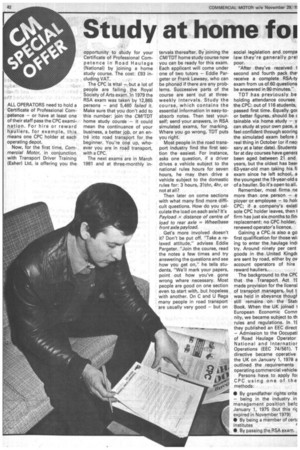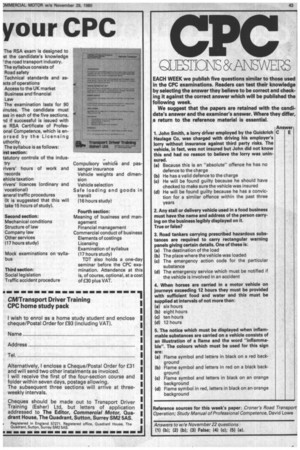Study at home fol your CPC
Page 44

Page 45

If you've noticed an error in this article please click here to report it so we can fix it.
ALL OPERATORS need to hold a Certificate of Professional Competence — or have at least one of their staff pass the CPC examination. For hire or reward hauliers, for example, this means one CPC holder at each operating depot.
Now, for the first time, Commercial Motor, in conjunction with Transport Driver Training (Esher) Ltd, is offering you the
opportunity to study for your Certificate of Professional Competence in Road Haulage (National) by joining a home study course. The cost: £93 including VAT.
The CPC is Vital — but a lot of people are failing the Royal Society of Arts exam. In 1979 the RSA exam was taken by 12,865 persons — and 5,460 failed it. Make sure that you don't add to this number: join the CM/TDT home study course — it could mean the continuance of your business, a better job, or an entre into road transport for the beginner. You're one up, whoever you are in road transport, with a CPC.
The next exams are in March 1981 and at three-monthly in
tervals thereafter. By joining the CM/TDT home study course now you can be ready for this exam. Each applicant will come under one of two tutors — Eddie Pargeter or Frank Lewsey, who can be phoned if there are any problems. Successive parts of the course are sent out at threeweekly intervals. Study the course, which contains the essential information in easy-toabsorb notes. Then test yourself; send your answers, in RSA simulated exams, for marking. Where you go wrong, TOT puts you right.
Most people in the road transport industry find the first section the easiest. For instance, asks one question, if a driver drives a vehicle subject to the national rules hours for seven hours, he may then drive a vehicle subject to the domestic rules for: 3 hours, 31/2hr, 4hr, or not at all?
Then later on come sections with what many find more difficult questions. How do you calculate the load on each axle? It's Payload x distance of centre of load to rear axle = Wheelbase front axle payload.
Get's more involved doesn't it? Don't be put off. "Take a relaxed attitude," advises Eddie Pargeter. "Join the course, read the notes a few times and try answering the questions and see how you get on," he tells students. "We'll mark your papers, point out how you've gone wrong where necessary. Most people are good on one section even to start with, but hopeless with another. On C and U Regs , many people in road transport are usually very good — but on social legislation and compa law they're generally prel poor.
"After they've received t second and fourth pack the, receive a complete RSA-ty exam from us of 60 questions be answered in 90 minutes."
TDT has previously be holding attendance courses the CPC: out of 116 students, passed first time. Equally go( or better figures, should be t tamable via home study — y can study at your own pace, a feel confident through scoring the simulated exam before t real thing in October (or if neci sary at a later date). Students far at day courses have genera been aged between 21 and years, but the oldest has beer 63-year-old man taking his fi exam since he left school, a the youngest the 19-year-old s of a haulier. So it's open to all.
Remember, most firms ne more than one person — e ployer or employee — to holt CPC; if a company's exist' sole CPC holder leaves, then 1 firm has just six months to fin' replacement: no CPC holder, renewed operator's licence.
Gaining a CPC is also a go first qualification for those wir ing to enter the haulage indi try. Around ninety per cent goods in the United King& are sent by road, either by ov account operators of hire reward hauliers.
The background to the CPC that the Transport Act 1.5 made provision for the licensi of transport managers, but t was held in abeyance thougf still remains on the Stab Book. When the UK joined 1 European Economic Co= nity, we became subject to th rules and regulations. In 1E they published an EEC direct — Admission to the Occupati of Road Haulage Operator National and lnternatior Operations (EEC 74/561). 7 directive became operative the UK on January 1, 1978 a outlined the requirements operating commercial vehicle: Persons have to apply foi CPC using one of the methods: • By grandfather rights crite
— being in the industry in management position befc January 1, 1975 (but this rit. expired in November 1979)
• By being a member of certz institutes • By passing the RSA exam. The RSA exam is designed to st the candidate's knowledge the road transport industry. The syllabus consists of Road safety Technical standards and asacts of operations Access to the UK market Business and financial Law
The examination lasts for 90. lmutes. The candidate must ass in each of the five sections, id if successful is issued with le RSA Certificate of Profesonal Competence, which is enorsed by the Licensing uthority.
The syllabus is as follows: irst section: tatutory controls of the industry rivers' hours of work and records ehicle taxation rivers' licences (ordinary and vocational) leneral traffic procedures (It is suggested that this will take 15 hours of study).
Second section: Mechanical conditions Structure of law Company law Other services (17 hours study)
Mock examinations on -syllabus
Third section: Social legislation Traffic accident procedure Compulsory vehicle and passenger insurance Vehicle weights and dimension Vehicle selection Safe loading and goods in transit (16 hours study) Fourth section: Meaning of business and management Financial management Commercial conduct of business Elements of costings Licensing Examination of syllabus (17 hours study) TOT also holds a one-day seminar before the CPC examination. Attendance at this is, of course, optional, at a cost of £30 plus VAT.




































































































